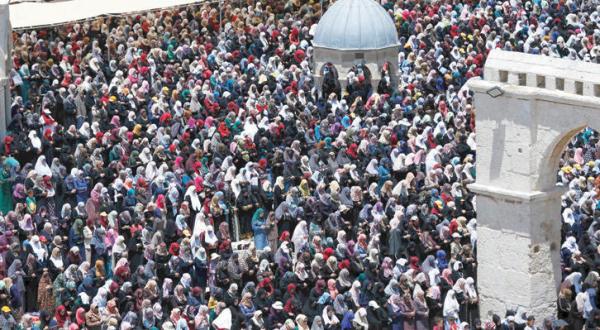Despite harsh measures taken by Israeli forces including the erection of barriers and preventing young people from praying at Al-Aqsa mosque, about 140,000 worshippers were able to perform Friday prayers at Al-Aqsa Mosque yesterday (the second Friday of the month of Ramadan). Meanwhile, the Supreme Islamic Council supporting Jerusalem and the Al-Aqsa mosque has complained about such procedures, and has appealed to the world to intervene in order to give Muslims the freedom of worship in their homes.
Israeli forces have been deployed in the area around occupied East Jerusalem, and set up dozens of checkpoints on the roads leading to Jerusalem within the West Bank as part of a series of revengeful acts on Palestinians for the Tel Aviv attack which took place earlier this month. These forces have turned the Old City of Jerusalem into military barracks after around 3,000 of its soldiers were deployed there since the early morning. These forces have also been preventing thousands of Palestinian youths under the age of 45 from entering the city of Jerusalem, and have been stopping Palestinian youth in cars at military checkpoints.
Hundreds of Palestinians have tried to enter Jerusalem by climbing Israel’s apartheid wall, especially in the Al-Ram village which is north of the city. However, Israeli patrols have been pursuing and prosecuting them. They have also been shooting at the Palestinians with metal rubber-coated bullets. In addition to this, five young men were arrested near the town of Beit Hanina after they were able to jump over the wall. Two of them sustained bruises and scratches.
Worshippers came mainly from East Jerusalem itself and Arab towns in Israel, and those over the age of 45 from the West Bank also attended the prayers. Israel permitted 300 Palestinians to come from the Gaza Strip specifically to pray at Al-Aqsa mosque.
In a statement, the Supreme Islamic Council supporting Jerusalem and Al-Aqsa considered these measures aimed at violating the Al-Aqsa mosque and Jerusalem as repressive. It added that twice this number of worshippers usually pray at Al-Aqsa mosque but that measures taken by the occupiers have prevented this.
